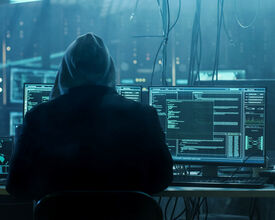Cyber security, data breaches, malware? Does that seem like a far-from-your-bed show for you as an event professional? Cyber security should be a top priority, especially now that events are increasingly supported and even controlled by technology.
In this article you can read about the risks you run, how cyber criminals work in practice, and what you can do to stay one step ahead of them.
For starters, cybersecurity means deploying people, policies, processes and technologies to protect organizations, their critical systems and sensitive information from digital attacks (source, Gartner). Cyber criminals don't just go after big companies. They targeted all companies, and that can be your event or event company, because at events they find what they are looking for: data from large numbers of people. Data is the new gold, protecting it is your latest challenge.
Let's make it more concrete. What is interesting data for cyber criminals? Think of credit card numbers, but also national register numbers and dates of birth, useful if criminals want to steal an identity. Other attractive data for these gentlemen and ladies are email addresses and telephone numbers, which are frequently used in phishing scams. If you are organizing a large event with hundreds or thousands of attendees, then you are an ideal target for cyber criminals!
Cybercrime: danger for your guests, danger for your company
A cyber attack naturally has negative consequences for the people who attend your event, but there is also damage to your company and your reputation.
If your event is hacked, you can expect lawsuits, especially in Europe where you are obliged to take security measures under the GDPR law. Europe is committed to restoring control of personal data to the individual, which is why all companies must take the necessary measures to protect personal data. Especially if you manage large data files with personal information (such as at events and festivals), the lack of the right measures can lead to high fines! GDPR also requires you to have protocols or procedures in place for when things go wrong and also requires you to report an incident.
Examples of Cyber Threats
In principle, hackers can attack any device connected to your network, including your guests' smartphones that are connected to your network.
Phishing emails are styled to perfectly resemble communication from your event. Hackers add a link with which they try to extract data from your employees in order to log in to your event software. This is the most common way of hacking systems. For example, hackers simply log in to your registration software and simply download all data.
Even worse is ransomware, also known as ransomware. The cyber criminal enters your systems and introduces a virus. The villain does this via a phishing e-mail or, if he or she gets the chance, to insert an infected USB stick into a device. Once inside, the virus encrypts all data and you will not get it back until you have paid a hefty ransom. For organized crime this is a simple and safe way to earn (a lot of) money quickly, for you this is a disaster.
Vigilance and common sense
Common sense will of course also help you in the fight against cybercrime, just as you do in your private life. A few tips:
- Keep your software up to date: Installing software updates for your operating system and programs is critical. Always install the latest security updates on all your devices
- Good password management: Unique passwords with letters, numbers and special characters, two-factor authentication and a password manager help you to have strong passwords for all your accounts.
- Install a good antivirus program. Also on Mac. This way you can avoid a lot of trouble.
- Beware of suspicious emails: phishing scams are usually carried out by email, but it can also be done by phone, text message or via social networking sites.
- Be careful what you click: unknown websites or downloading software from untrustworthy sources can contain malware that installs (often silently).
- Never leave devices unattended: Physical security is just as important as technical security.
- Train your team on cyber threats and what to do/don't do!
Cyber insurance
Prevention is always better than cure. But even if you have taken all possible measures, your company can still fall victim to cybercrime. Did you know that you can insure yourself against hacking with cyber insurance? You are then insured against liability for damage caused by a cyber incident or system intrusion to third parties and you can count on assistance from cyber specialists.
Conclusion: cybersecurity is a top priority for the event industry
Provide space and a budget for your event planning (good preparation is half the battle) and engage a qualified security expert. Together you devise a strategy that protects your company and your guests against cybercrime.
What you can do anyway: secure your WiFi network at your event so that data from visitors is not intercepted. And select a secure registration platform and event software. By the way, do you already know the free (and safe) event management software from event planner?
Dutch
Cyberbeveiliging, datalekken, malware? Lijkt dat een ver-van-je-bed show voor jou als eventprofessional? Cyberbeveiliging dient, zeker nu evenementen meer en meer door technologie ondersteund en zelfs gestuurd worden, een topprioriteit te zijn.
In dit artikel lees je welke risico's je loopt, hoe cybercriminelen concreet te werk gaan, en wat je kunt doen om ze een stap voor te zijn.
Om te beginnen, cybersecurity betekent mensen, beleid, processen en technologieën inzetten om organisaties, hun kritieke systemen en gevoelige informatie te beschermen tegen digitale aanvallen (bron, Gartner). Cybercriminelen gaan lang niet alleen achter grote bedrijven. Ze targetten alle bedrijven, en dat kan gerust jouw evenement of eventbedrijf zijn, omdat ze bij events vinden wat ze zoeken: data of gegevens van grote aantallen mensen. Data is namelijk het nieuwe goud, het beschermen ervan je nieuwste uitdaging.
Laten we het concreter maken. Wat is interessante data voor cybercriminelen? Denk aan creditcardnummers, maar ook rijksregisternummers en geboortedata, handig als criminelen een identiteit willen stelen. Nog aantrekkelijke gegevens voor deze heren en dames zijn e-mailadressen en telefoonnummers, die veelvuldig worden ingezet bij phishing-scams. Organiseer jij een groot evenement met honderden of duizenden aanwezigen, dan ben jij dus een ideaal target voor cybercriminelen!
Cybercriminaliteit: gevaar voor je gasten, gevaar voor jouw bedrijf
Een cyberaanval heeft natuurlijk negatieve gevolgen voor de mensen die je event bijwonen, maar schade is er ook voor jouw bedrijf en je reputatie.
Als je evenement wordt gehackt, mag je rechtszaken verwachten, zeker omdat je in Europa, door de GDPR, verplicht bent veiligheidsmaatregelen te treffen. Europa streeft ernaar de controle over persoonsgegevens terug bij het individu te leggen, en daarom moeten alle bedrijven de nodige maatregelen nemen om persoonsgegevens te beschermen. Zeker als je grote databestanden met persoonlijke informatie beheert (zoals bij evenementen en festivals), kan het gebrek aan de juiste maatregelen leiden tot hoge boetes! De GDPR eist ook dat je protocollen of procedures hebt voor wanneer het misgaat en schrijft ook voor dat je een incident verplicht moet melden.
Voorbeelden van cyberbedreigingen
In principe kunnen hackers elk apparaat dat op je netwerk is aangesloten, aanvallen, ook de smartphones van je gasten die verbonden zijn met je netwerk.
Phishing-e-mails worden zo vormgegeven dat ze perfect lijken op communicatie van jouw evenement. Hackers voegen een link toe waarmee ze proberen gegevens te ontfutselen bij jouw medewerkers om zo op jouw eventsoftware in te loggen. Dit is de meest voorkomende manier van hacking van systemen. Zo loggen hackers gewoon in op je registratiesoftware en downloaden alle data eenvoudigweg.
Nog erger is ransomware, ook wel gijzelsoftware genoemd. De cybercrimineel dringt je systemen binnen en introduceert een virus. De snoodaard doet dat via een phishing-mail of als hij of zij de kans krijgt, via een geïnfecteerde USB-stick in een apparaat te steken. Eenmaal binnen, versleutelt het virus alle gegevens en die krijg je pas terug, als je een flinke som losgeld hebt betaald. Voor de georganiseerde misdaad is dit een eenvoudige en veilige manier om snel (veel) geld te verdienen, voor jou is dit een ramp.
Waakzaamheid en gezond verstand
Gezond boerenverstand helpt je natuurlijk ook in de strijd tegen cybercriminaliteit, net zoals je dat doet in je privéleven. Enkele tips:
- Hou je software up-to-date: het installeren van software-updates voor je besturingssysteem en programma's is van cruciaal belang. Installeer altijd de nieuwste beveiligingsupdates op al je apparaten
- Goed wachtwoordbeheer: unieke paswoorden met letters, cijfers en speciale tekens, tweefactorauthentificatie en een password manager helpen je om sterke wachtwoorden te hebben voor al je accounts.
- Installeer een goed antivirusprogramma. Ook op Mac. Zo kun je heel wat narigheid voorkomen.
- Pas op voor verdachte e-mails: phishing scams worden meestal uitgevoerd per e-mail maar het gebeurt ook via telefoon, sms of via sociale netwerksites.
- Wees voorzichtig op wat je klikt: onbekende websites of het downloaden van software van onbetrouwbare bronnen kunnen malware bevatten die (vaak stil) wordt geïnstalleerd.
- Laat apparaten nooit onbeheerd achter: de fysieke beveiliging is net zo belangrijk als de technische beveiliging.
- Train je team in cyberbedreigingen en wat te doen/niet te doen!
Cyberverzekering
Voorkomen is altijd beter dan genezen. Maar zelfs als je alle mogelijke maatregelen hebt genomen, kan je onderneming nog het slachtoffer van cybercriminaliteit worden. Wist je dat je je kan verzekeren tegen hacking met een cyberverzekering? Je ben dan verzekerd tegen aansprakelijkheid voor schade die een cyberincident of systeeminbraak toebrengt aan derde personen en je kunt rekenen op bijstand van cyberspecialisten.
Conclusie: cybersecurity is een topprioriteit voor de event branche
Voorzie in je eventplanning (een goede voorbereiding is het halve werk) ruimte en een budget en schakel een gekwalificeerde beveiliging expert in. Samen bedenken jullie een strategie die jouw bedrijf én je gasten beschermt tegen cybercriminaliteit.
Wat je sowieso al kunt doen: beveilig je wifinetwerk op je evenement zodat data van bezoekers niet onderschept worden. En selecteer een veilig registratieplatform en eventsoftware. Ken jij overigens de gratis (en veilige) eventmanagement software van eventplanner al?







